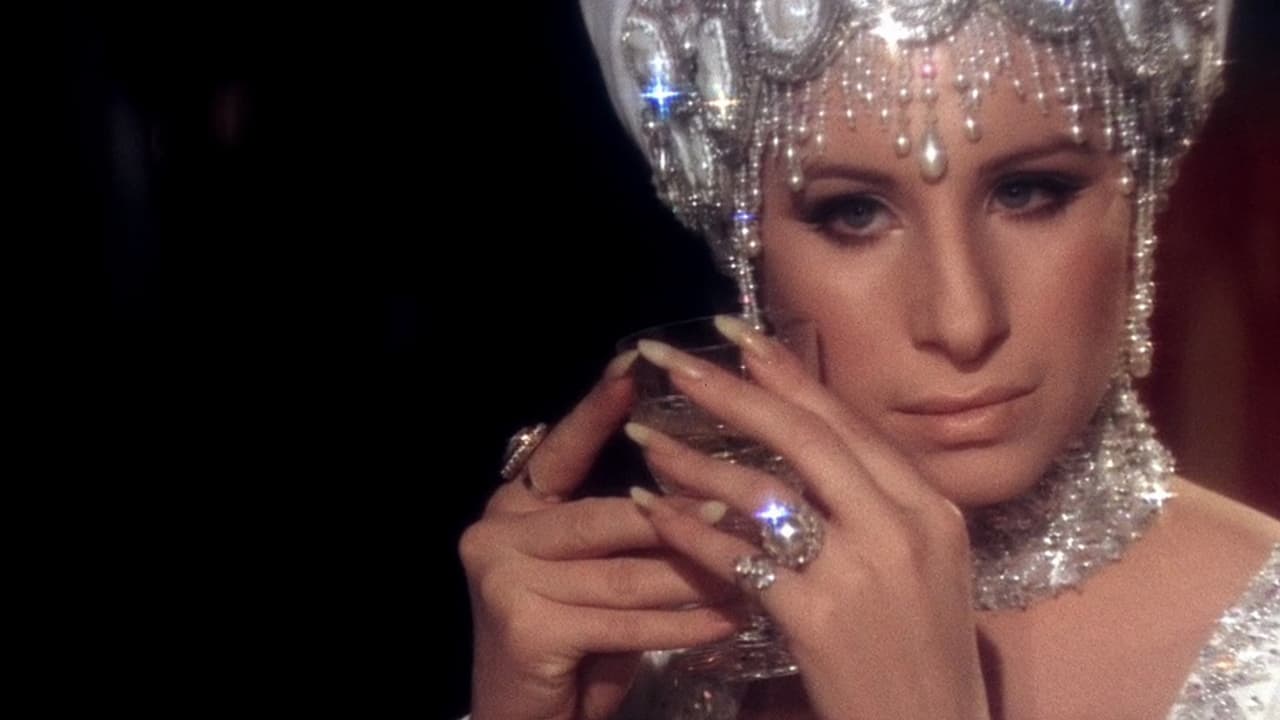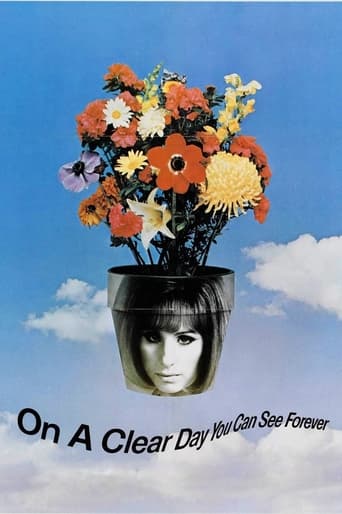

brilliant actors, brilliant editing
... View MoreI was totally surprised at how great this film.You could feel your paranoia rise as the film went on and as you gradually learned the details of the real situation.
... View MoreThe tone of this movie is interesting -- the stakes are both dramatic and high, but it's balanced with a lot of fun, tongue and cheek dialogue.
... View MoreIt's a good bad... and worth a popcorn matinée. While it's easy to lament what could have been...
... View MoreI saw this film on its first release, then immediately bought the soundtrack album. The songs, by Lerner and Lane, still stand up. I don't think the film was very successful. Vincent Canby of the New York Times gave it a lackluster review that had little to criticize about it or its star; just vague insinuations of disappointment.Barbra Streisand had shined in "Funny Girl" and then taken a less stellar, though titular role, in "Hello Dolly!" "On a Clear Day" was the third stage-to-screen role to get the Streisand treatment. She plays a young woman, Daisy Gamble, with supernatural gifts, like premonition, telepathy and the ability to grow flowers with amazing speed. She convinces a professor to use hypnosis to cure her of her smoking habit. Yves Montand feels miscast as the academic who falls under her spell, but I have trouble thinking of a more suitable actor for the role. Robert Goulet comes to mind.As the professor works with his willing subject, she regresses to reveal an unexpected past. Thanks to Director Vincent Minelli, Streisand's exotic beauty is fully realized. Some wonderful costuming helps complete the transformation.Streisand's comedic abilities should not be overlooked. As she did in "Funny Girl" and would later do in "They Way We Were", she can combine self-deprecating humor and an unexpected beauty very convincingly.The film suffers somewhat from a weaker third act, but remains engaging. The music and Streisand's vocalizations remind us that no one else has done more to keep the musical genre alive during this era.With better editing and a few tweaks this could have been a superior film, but it is still worth seeing.
... View MoreThe final musical directed by the legendary Vicnente Minnelli, ON A CLEAR DAY YOU CAN SEE FOREVER, is the expensive and lumbering 1970 film version of the 1965 Broadway musical, revamped to fit the talents of Barbra Streisand. In her third feature film, Barbra plays Daisy Gamble, a college student who we learn has ESP and the ability to make plants grow VERY quickly, who seeks the help of a college professor, Dr. Marc Chabot (Yves Montand) in helping her to quit smoking via hypnosis. While under hypnosis, Chabot discovers Daisy had a previous life as a 17th century temptress named Melinda Tentrees, who he falls in love with, but has to deal with the dull and annoying Daisy to get to the ever fascinating Melinda. This inventive Broadway musical has been dramatically re-tooled into a Barbra vehicle and despite Minnelli's still evident eye for color and cinema landscape, this long lumbering film fails to sustain interest until the end, despite some lovely scenery and breathtaking period costuming by the legendary Cecil Beaton. Streisand and Montand have no chemistry whatsoever and Bob Newhart, Simon Oakland, Larry Blyden, Elain Giftos, and Jack Nicholson (!?!)are wasted in pointless supporting roles. The severely tampered with Burton Lane-EY Harbug score includes "Hurry, It's Lovely Up Here", "What did I have that I Don't Have?", "Melinda", "Go to Sleep", and "Come Back to Me." For hard-core Streisand addicts only.
... View MoreJust saw it, and I loved it! What struck me was the beauty of the writing; truly intelligent and exciting dialog, solidly worldly and then suddenly transcendent. There was this one moment near the end where Montand is giving Daisy his impassioned pep talk, leading to a capstone pronouncement. He pauses.... And I knew exactly what he was going to say before he said it; and not because it was melodramatically predictable, but rather because it was magnificently true.My only qualification is a "drat it" regret that not all the songs were great. Half were well crafted, and the other half are poor-to-middling, with one having truly cringe-inducing lyrics. That's too bad; dropped the ball there. But the blockbuster songs are excellent. I'd always wanted to hear more Montand, and there he was giving the songs the timing and smooth delivery one expects from a great entertainer.I can see why some folks think of this as a lesser period piece. But, like I said, I feel the writing lifts this out of the period and invites us to listen and watch with everything we have. And isn't that what art is supposed to do? Watch it.
... View MoreIn a lot of ways this film points out exactly what is wrong with the musical genre in my opinion.Here we have a very entertaining story, the Daisy Gamble character is fascinating (although it is absolutely implausible that Daisy would have ever been engaged to a yutz like Warren), but the entire production would have been immensely better with all of the songs removed. Ms. Streisand's opening and closing songs are fine, but the majority of the songs within the movie are terrible and only disrupt and distract from what is otherwise a cute story. Yves Montand's songs are particularly dreadful, even his swear-word strewn finale' "Come Back To Me" is regrettable. Whoever told him he could sing?! If you can overlook the terribly annoying songs (just fast forward, when people stop flailing their arms about, they're usually through singing), it's really fun movie.
... View More